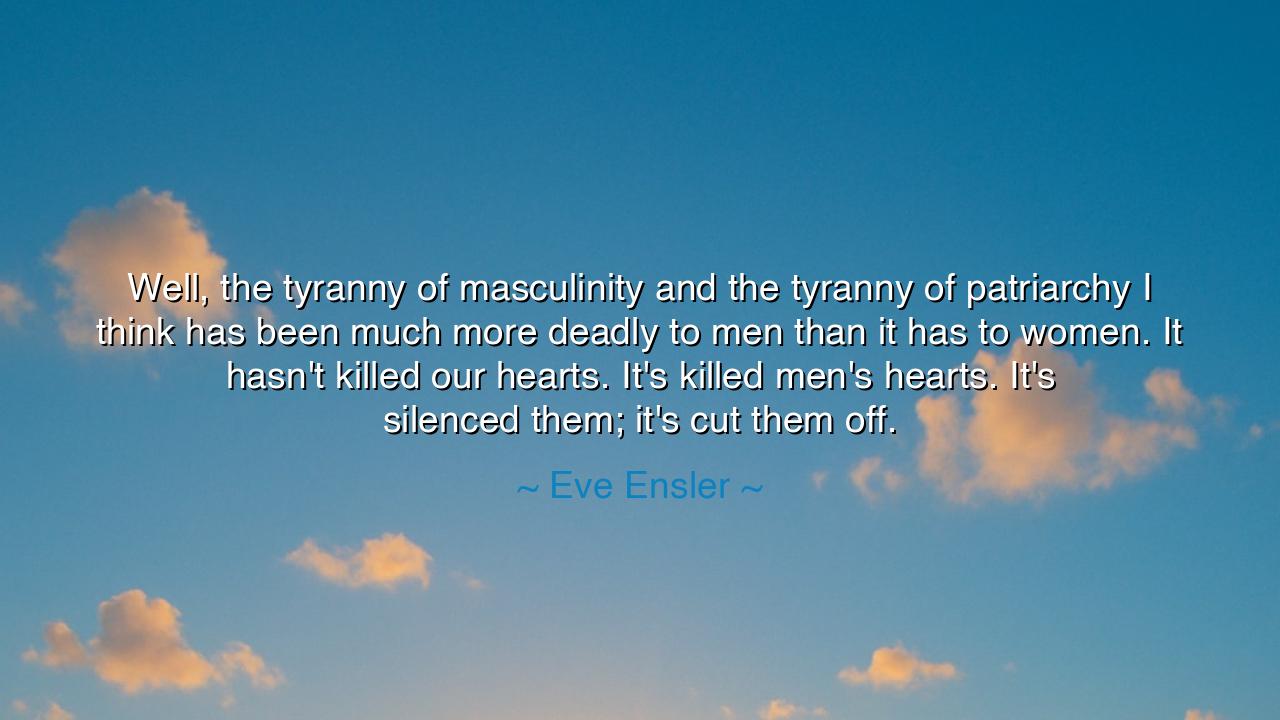
Well, the tyranny of masculinity and the tyranny of patriarchy I
Well, the tyranny of masculinity and the tyranny of patriarchy I think has been much more deadly to men than it has to women. It hasn't killed our hearts. It's killed men's hearts. It's silenced them; it's cut them off.






Eve Ensler, the fiery voice who gave the world The Vagina Monologues, spoke with prophetic force when she declared: “Well, the tyranny of masculinity and the tyranny of patriarchy I think has been much more deadly to men than it has to women. It hasn’t killed our hearts. It’s killed men’s hearts. It’s silenced them; it’s cut them off.” These words are not merely an indictment of oppression but a revelation of its hidden cost. They remind us that chains do not bind only those who are visibly shackled, but also those who forge them, for tyranny devours its masters as surely as its slaves.
The meaning is both tender and tragic. Ensler tells us that patriarchy, long imagined as a system serving men, is in truth a poison that wounds them deeply. It commands them to be strong but not tender, dominant but not vulnerable, proud but not gentle. In doing so, it severs them from their own hearts. Where women have struggled against external silencing, men have too often been silenced within—denied the freedom to weep, to nurture, to confess fear, to speak the language of love. This, she declares, is the deeper death: not the loss of life, but the loss of soul.
History gives us countless examples. Consider the warriors of Sparta, trained from childhood to endure pain without flinching, to kill without remorse, to die without tears. They were hailed as heroes, yet behind the glory was a system that mutilated their hearts. Their humanity was stripped from them in the name of strength. They lived and died as instruments of patriarchy, but how many never knew the fullness of tenderness, friendship, or joy? Their chains were gilded, but chains they remained.
Even in modern times, the story repeats. Generations of fathers taught their sons that to cry was weakness, that to speak of love was shameful, that to be gentle was to be less of a man. And so, silence spread like a shadow. Countless men carried grief alone, their words unspoken, their feelings locked away. Wars were fought, families fractured, and lives ended by the unseen weight of an unyielding masculinity. Ensler’s cry reveals this truth: women’s bodies may have borne the violence of patriarchy, but men’s hearts have been its silent tombs.
The deeper lesson is this: liberation cannot belong to one gender alone. If women fight for their voices, men too must fight to reclaim their hearts. The true freedom is not in dominance but in wholeness—where every soul, whether man or woman, is free to love, to feel, to speak, to live without the tyranny of rigid roles. For humanity is not made for halves; it is made for fullness. And without healing men, the world itself cannot heal.
Therefore, O listener, take this wisdom to heart: do not let the tyranny of patriarchy cut you off from your true self. If you are a man, reclaim your heart; if you are a woman, encourage men to do so. Refuse to measure worth by hardness alone. Cherish compassion as strength, vulnerability as courage, tenderness as power. Let each person—man or woman—be free to live as whole, not as fractured beings.
Practical action is this: speak openly with those around you. Allow tears to fall without shame. Celebrate empathy and kindness in sons as much as in daughters. Question the voices that call gentleness weakness. Build communities where silence is broken and hearts are free to breathe. For each small act of defiance against the old tyranny opens a space for healing.
So let Ensler’s words resound as a prophecy for generations: the tyranny of masculinity has not killed women’s hearts—it has killed men’s. Let this truth awaken us all, for the task of this age is not merely to free women from subjugation, but to free men from silence. Only then shall humanity rise whole, no longer cut off, but alive with love, fierce with justice, and radiant with compassion.






AAdministratorAdministrator
Welcome, honored guests. Please leave a comment, we will respond soon